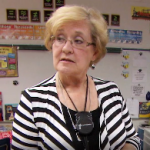Stopping bullying in its tracks: how one teacher is said to have changed countless children's lives
Posted on
Every Friday, this maths teacher asks her students to write down four names on a piece of paper _ the names of four classmates they would like to sit with the following week.
They must also nominate a student they think has been a good friend that week.
The students then privately hand their answers to the teacher.
The teacher studies the slips of paper and looks for patterns
When the school day is over the teacher, Kathy Pitt, collects the slips of paper and places them in front of her.

She studies them and looks for patterns.
Who is not getting requested by anyone else?
Who doesn’t even know who to request?
Who had a million friends last week and none this week?
The real reason for the notes isn’t to do a new seating chart or to find that week’s “best classmate”.
Instead, it is to identify lonely children or children who are struggling to connect with others.
Who is being bullied, who is bullying?
Through this exercise Kathy can identify which children are being left out and pick up clues on who is being bullied and who is bullying.
Through it, lonely children get noticed.
Kathy believes outward aggression can begin as inner loneliness.
She looks for patterns early in the children’s lives, to be able to help those who need it in time.
Before they resort to aggression _ against other students and against themselves.
Kathy makes sure that the kids who need help get it.
This year Kathy will retire, after year’s of changing countless children’s lives.
Her supporters want people to share the following video to spread the word of Kathy’s method and to honour her as a teacher.
Watch the video made in honor of Kathy Pitt
You clench your jaw. In the pit of your stomach, there’s that familiar sinking feeling.
You are reading an article, having a conversation, listening to the radio. And suddenly someone drops the A-bomb: autistic. “Brace yourself,” thinks you, the weary autism parent. “Breathe deeply.”
With the worryingly rapid rise of diagnoses in autism across the world over the past couple of decades comes another tedious phenomenon: the casual use of the word “autistic” to describe behaviour by people who, frankly, don’t know a lot about autism.
I have a little boy who is eight and he is what is known as being “on the autism spectrum”. And every time I look into his big eyes my heart explodes, with love, into a million little shards. I’m terribly biased that way.
Since my boy got his diagnosis, I flinch every time I hear these assumptions about someone who is a bit geeky having Asperger’s, or about someone’s misanthropy in the workplace meaning they are “on the spectrum”, or the idea that all autistic people can reel off complicated long division or recite Qantas flight schedules like Rain Man.
He is much better at English than maths
What’s his special talent?” people often ask me of my boy, assuming all autistic people are savants.
And then there are those really awesome people who think they are the only ones who “get him” and congratulate themselves on their miraculous powers of understanding, their “special connection”.
 The idea that autistic people don’t care about other people is offensive
The idea that autistic people don’t care about other people is offensive
The depressing data will show that autistic people are lucky to get a job – any job – let alone control the world through a technology hub. We parents of these kids can only hope better education will change that.
But apart from all of that, the idea that people on the autism spectrum don’t know or care about other people is offensive and wrong. It makes their ability to navigate a path through this world so very vexed. Let’s be very clear: how people with autism might appear in company and what they know or think about, or care about, are quite distinct things.
My boy cares deeply about other people. He tells his little sister, his dad and me that he loves us many times a day.
Sometimes he misreads people’s intentions – difficulty with interpreting facial expressions is a hallmark of autism.
But he is so empathetic that sometimes it seems to literally hurt. He can’t bear to see me cry.
I have seen him, when another child is hurt, run over and pat the child and loudly console them (and sometimes he tells them that he loves them).
He adores babies and told his five-month-old cousin the other day he was “the most beautiful baby in the whole, whole world”.
He doesn’t say the “cool” thing; he doesn’t check his behaviour like a neurotypical kid would. He just does what feels right.
At a local playground, he will often run up to children, tell them his full name (and his sister’s, and his Mum’s, and his Dad’s, and his Nana’s …).
He’ll ask to play. He’ll beam from ear to ear. He might throw in some information on the alligator population of Louisiana or what snakes you are likely to find in the wilds of Panama.
He’s then confused when they don’t want to hang out. It happened just today. The kids kicked the soccer ball away from him and ran off.
I saw him standing, alone, in the middle of the oval. My heartbreakingly handsome boy. Kicking a tuft of grass and pretending not to notice they had shunned him.
He is not the one who doesn’t care about other people – I would say they are, the people who can’t handle “different”. And by different I mean enthusiastic, guileless, a bit wacky, nice.
I am not saying autistic kids are all angel-children. The world is a difficult place for them to navigate.
Some days, I have wept in frustration
They are often beset by sensory overload – harsh lights sting their eyes, crowds overwhelm, they struggle to listen when noises like the bark of a dog or the clattering of dishes or the whoosh of a coffee machine compete for their attention. Sometimes it all gets too much.
They lash out; they say exactly what they think regardless of propriety, they hide under a blanket. They feel too much. Some days, I have wept with frustration at this.
But all of this is often misinterpreted. I remember a mother who was upset that my son, then six, had pushed hers when my boy was unregulated – that is, overwhelmed by noise and confusion.
She accused my boy of bullying. If only she knew how hilariously off the mark that was.
My boy simply wouldn’t know how to bully. He’s just not capable of that sort of manipulation.
He was dazzled with sensory frustration and there was a kid in front of him. He pushed him. He told me later that day the kid was his friend. He made a “sorry” card for him.
The kid’s mum responded by trying to petition the school principal to get my six-year-old expelled.
The oft-repeated notion that autistic people are disaffected loners, implying that they are perhaps prone to crime, perhaps the high school shooter – “it’s always the quiet ones” – stings.
I once asked a forensic psychiatrist whom I was interviewing about the stats on people with autism becoming violent or sex offenders.
His look softened and he said, “You’ve got a little one on the spectrum?” I nodded. “I am not sure if this makes you feel any better, but they are far more likely to be victims than offenders,” he said.
The idea that autistic people are not feeling deeply, not analysing their surroundings, their social dynamics, their peers, is also off the mark.
I will never forget a teacher telling me about an autistic boy who had been non-verbal all his life being given a communication tool at the end of high school.
With it, he dictated an essay about his life. It was, by her account, profoundly perceptive. His teachers were floored. He critiqued the various therapies he had been given with maturity and wry scepticism no one knew he possessed.
He joked about his parents. He observed his social situation with great clarity. And this was someone who had barely spoken a word in his life.
It is no longer acceptable to name-call.
Refrigerator mothers have gone, but refrigerator children remain
We’ve moved past the era when it was assumed that cold “refrigerator mothers” created their children’s autism.
But here’s the thing, the refrigerator mothers are gone, but refrigerator children remain.
People keep assuming that to be autistic means to be cold, aloof, out of touch with humanity.
Somehow it’s seen as OK to stereotype people with autism. It’s not. It hurts those people and everyone that loves them. Next time someone does it around you, call them on it.
